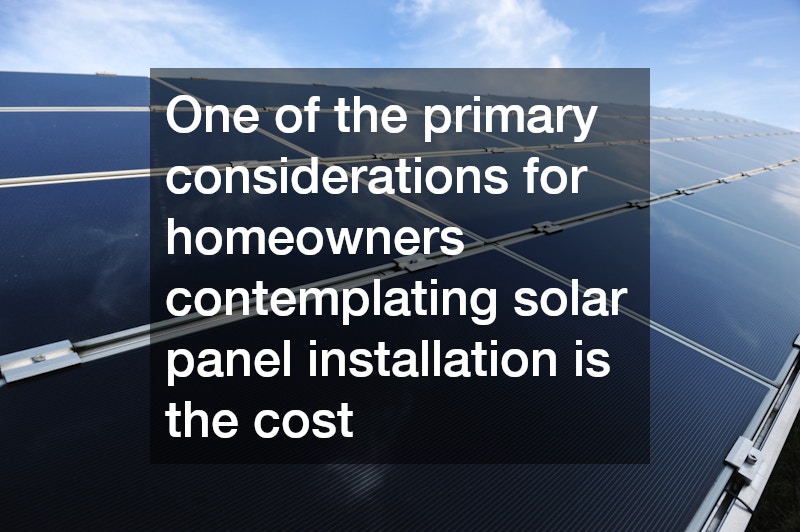In recent years, solar panels have become increasingly popular among homeowners looking to reduce their environmental impact and save on energy costs. As the effects of climate change become more pronounced, many individuals are turning to renewable energy sources to offset their carbon footprint. Solar panels offer an attractive solution, utilizing the sun’s abundant energy to power homes and businesses.
The rise in popularity of solar panels can be attributed to several factors, including government incentives and the decreasing cost of solar technology. As solar installers gain more experience and the technology becomes more efficient, homeowners are finding it easier to invest in solar energy. This shift towards renewables is not only beneficial for the environment but also encourages the growth of local economies by creating jobs in the clean energy sector.
Moreover, the aesthetic appeal of modern solar panels has improved significantly, making them a more viable option for homeowners concerned about curb appeal. Advances in technology have led to the development of more sleek and efficient designs that integrate seamlessly with various roof types. As these developments continue, solar panels are expected to become an even more common sight in residential neighborhoods.
Cost-Benefit Analysis of Installing Solar Panels
One of the primary considerations for homeowners contemplating solar panel installation is the cost. While the initial investment can be substantial, it is important to weigh this against the long-term savings on energy bills. Typically, solar panels can result in significant reductions in electricity costs, effectively paying for themselves over time.
Incentives such as tax credits and rebates offered by governments can greatly offset the initial costs of installation. These programs aim to make renewable energy more accessible and encourage widespread adoption. By researching and utilizing available incentives, homeowners can make solar energy solutions more financially feasible.
Additionally, the value solar panels add to homes should be factored into the cost-benefit analysis. Properties equipped with solar energy systems tend to sell at a premium compared to those without, potentially increasing their market value. This added value further enhances the appeal of solar panels as a worthwhile investment.
Environmental Benefits of Solar Energy
Beyond financial savings, solar panels offer numerous environmental benefits that are crucial in today’s fight against climate change. By harnessing solar energy, homeowners can significantly reduce their reliance on fossil fuels, cutting down on carbon emissions. This contributes to cleaner air and a healthier environment for future generations.
Adopting solar energy also helps conserve water resources, as solar panels require minimal water for electricity generation compared to traditional power plants. In areas prone to droughts, this can be a critical factor in deciding to go solar. By choosing solar energy, individuals play a part in reducing their local community’s environmental footprint.
Furthermore, as more households switch to renewables, the collective decrease in demand for conventional energy can lead to systemic changes. This shift may result in less frequent use of coal and natural gas, ultimately leading to a decrease in pollution. The cumulative impact of these changes can make a noticeable difference in global environmental health.
Choosing the Right Solar Installers
Selecting the right solar installers is a crucial step in ensuring that your solar panel system is set up efficiently and effectively. A good installer will not only advise on the best system for your needs but also handle the technical aspects of installation. Experience, reputation, and certifications should be key factors when evaluating potential installers.
It is advisable to get quotes from multiple installers to compare prices and services offered. While cost is a consideration, the quality of installation is equally important to ensure longevity and performance of the solar energy system. Reading reviews and testimonials from other customers can provide valuable insights into the reliability of the solar installers.
Additionally, local installers may have better knowledge of state incentives and regulations, ensuring compliance and potentially saving you money on the installation. Building a relationship with a trusted installer can also be beneficial for future maintenance and upgrades. Informed decisions in selecting solar installers can greatly enhance the overall solar energy experience.
Installing solar panels is a decision that entails careful consideration of both the financial and environmental benefits. The initial investment is often mitigated by long-term savings on energy bills and government incentives. Over time, the financial returns, coupled with the increase in home value, can make solar panels a worthwhile investment.
Environmental benefits play a significant role as well, allowing homeowners to contribute to a sustainable future by reducing reliance on non-renewable energy sources. As awareness of climate change grows, adopting solar energy systems becomes an increasingly responsible decision. Solar panels not only promise financial rewards but also pave the way for a cleaner planet.
Ultimately, the decision to install solar panels resides with the potential homeowner, taking into account their personal circumstances and priorities. However, with advancements in technology and constantly improving financial incentives, the prospect of going solar appears increasingly beneficial. Consulting with experienced solar installers can provide the necessary insight to make an informed, rewarding choice.

